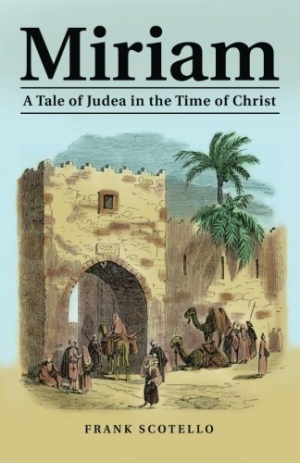Miriam
A Tale of Judea in the Time of Christ
Miriam is a warm, heartfelt historical romance centered in faith.
In Frank Scotello’s compelling tale of faith and love, Miriam, a young shopgirl lives under Roman occupation in ancient Israel.
Miriam’s gift for languages and numbers helps her to run her father’s stall in the markets of Judea. Hardworking and devout, she draws the eye of a Roman centurion, Gaius Fabius.
Gaius and Miriam could not be more different. They are from opposite backgrounds; they practice divergent religions. Gaius’s duty drags him toward conflict; Miriam journeys away from Judea, and their paths cross. A violent encounter puts them on the run; they flee, and initiate a romance that challenges everything they believe in.
Despite its historical context, Miriam and Gaius’s relationship develops without much drama. Originally, they interact only because Miriam speaks his language. They make a connection, but never quite put things in motion; Gaius makes small gestures that she rebukes. Over the course of their journey, the two connect and grow realistically into an endearing couple.
Miriam’s point of view dominates, and she narrates with balanced sentences, interesting rhythms, and clarity. Her decision to refuse an arranged marriage and leave Israel establishes her headstrong nature well.
Historical details come through characters’ descriptions; they help to set scenes and ground the story. Dialogue is historically accurate and engaging; secondary languages are not heavily used, and when they are, they are translated in context to keep things moving. Unfamiliar concepts are realistically encountered and are addressed through the story’s action—a river ferry, for instance, has no correlating term in Miriam’s lexicon.
In the beginning, Miriam reviles Gaius; as she becomes familiar with his backstory, actions, and thoughts, genuine affection develops between them. Their relationship becomes dynamic and grows realistically thanks to a steady series of revelations. Secondary characters are less dimensional, functioning more as devices to advance the plot.
The story is predictable. There are few twists or dramatic complications, and all are dealt with quickly. Key conflicts wrap up either with surgical violence or thanks to Miriam and Gaius’s quick thinking. Continual references to a messiah in Jerusalem, who turns out to be a saving grace for Miriam when she is sentenced to execution, bring Jesus into the picture; iconically, he says that only those without sin may condemn her, thus freeing her.
Miriam’s experiences lead to satisfying conclusions, and the book’s historical and biblical context reinforce the life-altering path she willfully chooses. Miriam is warm and heartfelt—a historical romance centered in faith.
Reviewed by
John M. Murray
Disclosure: This article is not an endorsement, but a review. The publisher of this book provided free copies of the book and paid a small fee to have their book reviewed by a professional reviewer. Foreword Reviews and Clarion Reviews make no guarantee that the publisher will receive a positive review. Foreword Magazine, Inc. is disclosing this in accordance with the Federal Trade Commission’s 16 CFR, Part 255.

